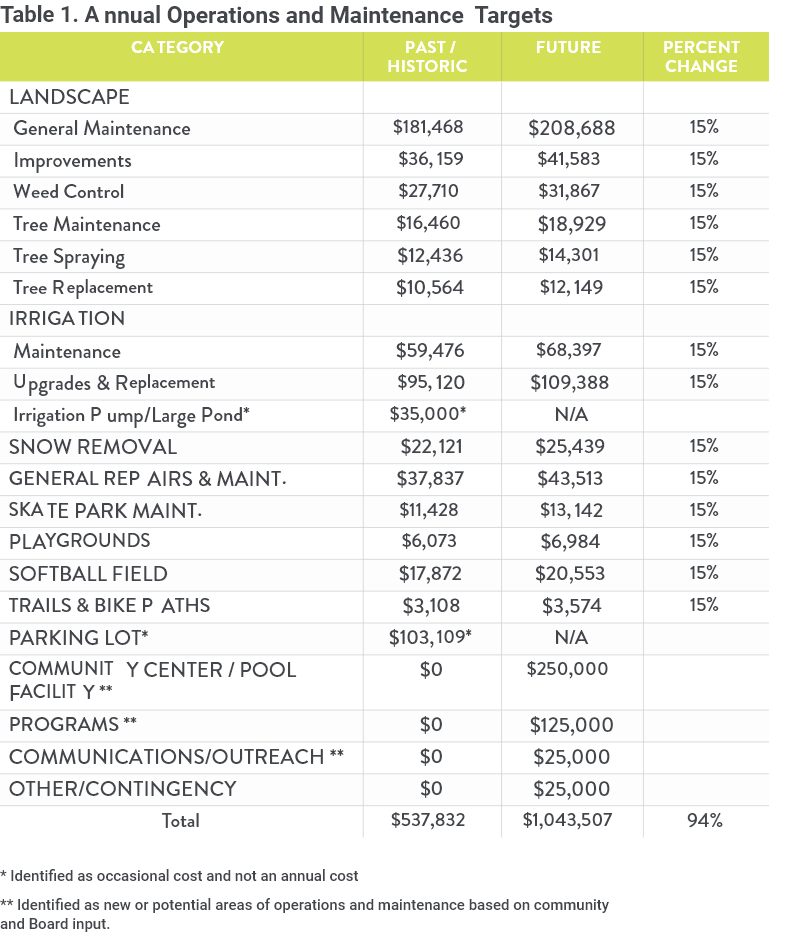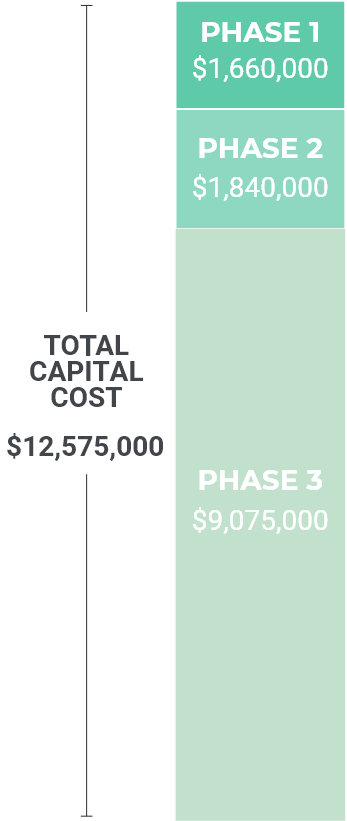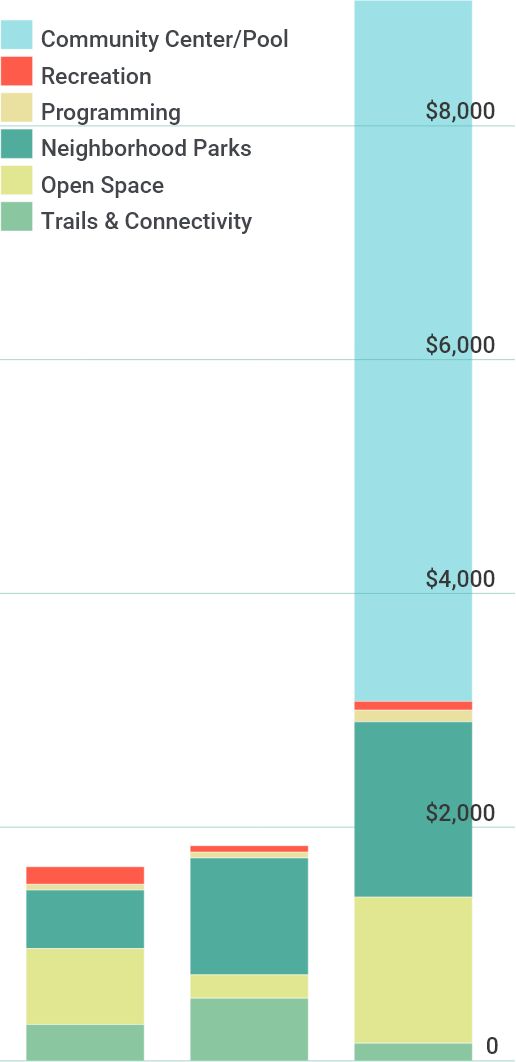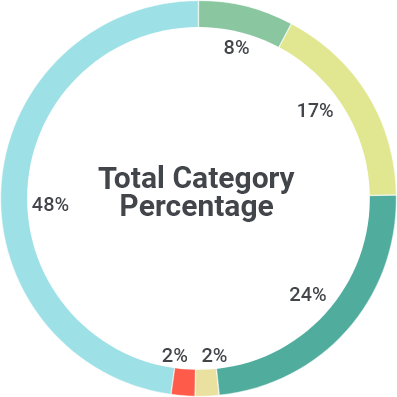Implementation Strategy
Implementation Strategy
Implementation Approach
RVMD has many tools available that can be used to implement several of the recommendations in this plan. The annual budget is managed effectively, and the District is in a good position to maintain existing assets and work through phased implementation over the next 10+ years, including incremental improvements to trails, open space, neighborhood parks and annual maintenance needs. However, as an outcome of the planning process and based on community input, there are a couple of major needs and considerations that would likely require new tax revenue. The major areas of need identified by the community include: 1) new community center and/or pool and 2) major enhancements and upgrades to Little Willow Creek and the large ponds.
The implementation strategy is organized to allow the District to phase implementation on an annual basis. Envisioned as a working advisory document, the implementation section provides a tool to plan, act and monitor phases of implementation over time.
Due to the complexity of implementation and the community’s desire to see improvements immediately while following through on the long-term vision of the plan, the implementation strategy is broken down into three main phases:
- “Quick Wins”
- Short-term
- Mid-term
- Long-term
Phase 1
Phase 1 implementation includes “Quick Wins” and Short-term projects that can be completed in a 1-3-year timeframe.
“Quick Win” Projects include:
- New Community Events in the Community Park
- Addition of paved sidewalks on paths created by residents
- Softball Field Improvements
- Imperial Park Improvements
Short-term Projects include:
- Improve crossings at Village Circle West
- Connection to Mule Deer Park from Brown Bear Way
- Seating and shade structures along Little Willow Creek
- Sidewalk improvement between upper and lower ponds
- Modification of pond embankment
- Access to ponds
Phase 2
Phase 2 implementation includes Mid-term projects that can be completed in a 4-5-year timeframe.
Mid-term Project include:
- Connection to Chatfield State Park
- Improve crossing to High Line Canal Trail
- Bike lane connection to Roxborough State Park
- Continuous soft paving edge along main walking path
- Educational signage along Little Willow Creek
- Educational signage near hogback
- Mule Deer Park Improvements
- Marmot Ridge Park
- Active Events and Programs within the Trails and Open Space
- Volleyball Court Improvements
- Basketball Court Improvements
Phase 3
Phase 3 implementation includes Long-term projects that can be completed in a 5 or more-year timeframe. Due to the large size and scope, a number of the Long-term projects will take multiple years to plan, design and implement.
- New trails at Hogback Ridge
- Little Willow Creek drainage and erosion improvements
- Landscape enhancement along Rampart Range Road
- Chatfield Farms Park Improvements
- Airplane Park Improvements
- New Park in Little Willow Creek Open Space
- Additional Programs and Activities with Other Partners (TBD)
- Skate Park Improvements
- Community Center and/or Pool
Maintenance and Ongoing Service Needs
District maintenance of the parks and open space assets is essential to facilitate the evolution of the RVMD as a premier location for living and celebrating the outdoor lifestyle of Colorado.
Ongoing maintenance increases property values as well as provides safety and security to the residents. Annual O&M (Operations and Maintenance) costs include planning, design, and implementation, programs, communications and community outreach, administrative and finance, recreation, property ownership and stormwater facility management. These functions are essential to achieving the long-term vision both in implementing this plan and maintaining the integrity of the vision in the future.

Capital Costs
Capital costs are the one-time, up-front costs to design and construct the major amenities or improvements in the plan. This implementation plan includes only prioritized projects identified in the recommendations. Although additional improvements may be contemplated after this plan is complete, for the purposes of projecting capital costs, we have chosen to prioritize the major improvements based on community and Board input.
Capital Cost by Phase

Capital Cost Phasing Categories

Total Category Percentage

Master Plan Recommended Capital Investments
Over the next 15 years, the recommended enhancements to RVMD will result in better open space, trails and connectivity, neighborhood parks, recreational facilities, new programs and the potential for a new community facility.
The Capital Investments are broken into three phases:
Phase 1 - Near term projects amounting to an estimated $1.6 million in capital improvements
Phase 2 - Medium term projects amounting to an estimated $1.84 million in capital improvements
Phase 3 - Long term projects amounting to an estimated $9 million in capital improvements
Phase 1 includes short-term and quick-win projects. These are projects that have already been completed or for which the District can use the current annual budget model to complete the work. Both Phase 2 and 3 would likely require a public vote by District residents to approve an increase in property taxes in order to raise the funds necessary for implementation.
In all cases, other than the potential community center and/pool facility, recommendations in this plan can be scaled or modified to work within the budget parameters determined by the Board and District residents. Depending on the scope and magnitude of the improvement, implementation may take longer but the project can still proceed and deliver on the recommendations set forth in the plan.